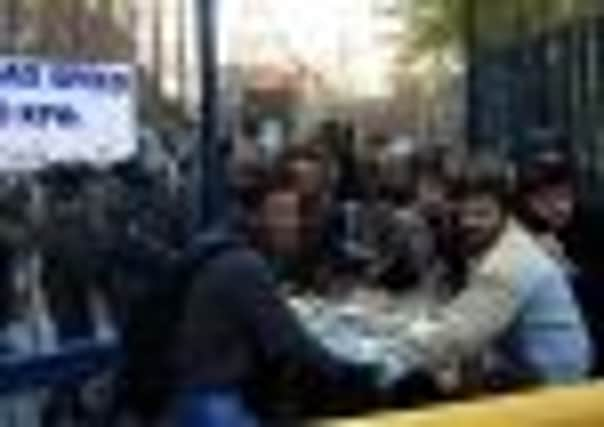Furious William Hague shuts down Iranian embassy


Foreign Secretary William Hague announced the dramatic move yesterday shortly after all British diplomats in Teh-ran were flown to Dubai for safety. He told parliament that Britain’s embassy in Tehran would be closed indefinitely.
“If any country makes it impossible for us to operate on their soil, they cannot expect to have a functioning embassy here,” Mr Hague said.
Advertisement
Hide AdAdvertisement
Hide AdEven so, as already tense relations with Iran plummeted to a new low, Mr Hague said Britain was not severing relations with Tehran entirely.
The attacks – the worst on a foreign mission in Iran since the US embassy was seized in the turbulent wake of the 1979 Islamic revolution, provoked widespread international condemnation – deepened Iran’s isolation, and highlighted a growing rift within Tehran’s ruling hardline elite.
Mr Hague said it was “fanciful” to believe the attacks did not take place with support from Iran’s regime.
Prime Minister David Cameron said: “The Iranian government must recognise that there will be serious consequences for failing to protect our staff. We will consider what these measures should be in coming days.”
Iran will come under more pressure today when European Union foreign ministers meeting in Brussels will discuss further economic sanctions against the regime over its nuclear programme. France has been pressing for an EU ban on Iranian oil imports. Sources last night said Britain will support that embargo.
EU members will weigh the desire to punish Iran with the need to keep channels open to defuse the nuclear row.
In solidarity with Britain, the ministers are also likely to discuss retaliatory measures against Iran for Tuesday’s debacle and Tehran’s decision a day earlier to expel the British ambassador, Dominick Chilcott.
Norway yesterday temporarily closed its embassy in Tehran for security reasons, but said it would not evacuate staff. And Italy said last night it was considering closing its embassy.
Advertisement
Hide AdAdvertisement
Hide AdIranian riot police had stood by idly while crowds of hardline students, led by plain-clothed members of the volunteer Basij militia chanting “Death to England”, broke into the high-walled British compounds.
They ransacked offices, burned Union flags, torched at least one embassy vehicle and ripped up portraits of the Queen. No embassy staff were hurt, although six had to take refuge in a secure room for several hours.
Riot police firing tear gas only flushed out the triumphant protesters, once widespread damage to property had been inflicted and “perfidious Albion” was seen to have been humiliated.
Mr Hague said Iran should be “ashamed”, adding that Britain is seeking compensation for the damage caused.
Eager Iranian state television crews were on hand to film the chaotic scenes. Notably, cameras were banned from covering the violent suppression by Basij militiamen of mass anti-government demonstrations following president Mahmoud Ahmadinejad’s disputed re-election in 2009.
Britain infuriated Tehran last week by imposing sanctions on Iran’s central bank after a report by the UN’s nuclear watchdog strongly suggested that the Islamic republic had conducted research into nuclear weapons.
Tehran insists its nuclear programme is designed solely to generate electricity.
The storming of the British compounds appeared to reflect a prolonged and bitter power struggle between Iran’s ruling hardliners that pits Mr Ahmadinejad’s government against his opponents in the parliament and judiciary who are loyal to the supreme leader, Ayatollah Ali Khamenei.
Advertisement
Hide AdAdvertisement
Hide AdIran’s foreign ministry issued a rare expression of regret on Tuesday night that contrasted sharply with a defiant statement yesterday by the powerful parliamentary speaker, Ali Larijani.
Maintaining the protests were spontaneous, he argued that Britain was to blame for the high emotions that underpinned the violent scenes.
“This anger is an outcome of decades of domineering moves by the British in Iran,” he told an open session of parliament.
Hardline Iranian newspapers also heralded the seizure of what they called the “Fox’s den”, alluding to Britain’s nickname in Iran as the “colonial old fox”.
The Iranian government, however, blamed the incident on the “unacceptable behaviour by a small number of protesters” and said several had been arrested and charged.
Although a hardliner, Mr Ahmadinejad appears keen to maintain working relations with EU countries in order to stave off further sanctions over Iran’s nuclear programme. But his hardline opponents seem to relish a crisis, hoping it will embarrass him and unite Iranians behind the unpopular regime.
Hostility to Britain, which has been at the forefront of pressing for more punitive sanctions over Iran’s nuclear programme, has deep resonance among Iranians which the regime often taps into when things are going badly at home.